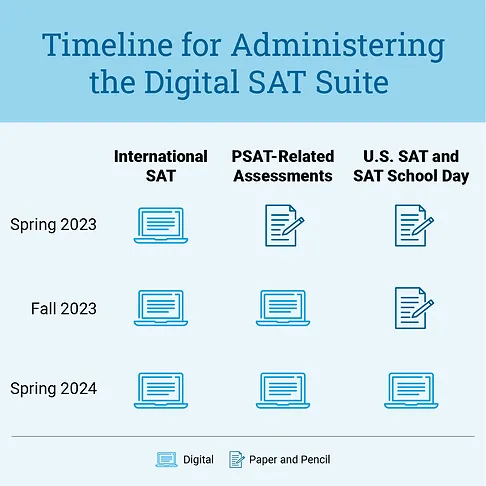The College Board recently announced that the SAT will be completely digital starting in 2024 for U.S. students and 2023 for international students. Here’s what the digital SAT means for students.

Last week, the College Board announced that the SAT will be completely digital by 2024 in the U.S. and by 2023 in some other countries. Some students may be taking this new version of the test as early as the October 2023 PSAT, meaning that current freshmen and sophomores should consider this when preparing for the SAT. This also comes at a time when many schools have eliminated the requirement for applicants to submit standardized test scores, prompting many to wonder what role standardized tests should play in the college admissions process.

The digital SAT has already been in effect throughout the pandemic due to social distancing guidelines, and most students and educators have reported that this change has made the test-taking process much easier. This is also being accompanied by a host of changes to the content on the SAT that will, ideally, make standardized testing less stressful for everyone involved on all fronts.
“The digital SAT will be easier to take, easier to give, and more relevant,” said Priscilla Rodriguez, vice president of College Readiness Assessments at College Board.
Below, we’ll break down what these changes are and how they’ll affect students going forward.
Shorter, More Efficient Testing
When these changes take effect, the testing time will be shortened from three hours to two hours. The digital SAT will include shorter reading passages with one question tied to each. Calculators will also be permitted on the math section in order to shorten the amount of time that test-takers will need to spend on mental math.
Students who took pilot versions of the digital SAT reported that the more efficient version of the test made it easier to read and stay focused, which means that this change could benefit students who had previously been exhausted by the amount of time the previous SAT required.
Take this into account when practicing for the digital SAT — don’t stop reading and expanding the variety of material that you review beforehand though. The same skills and knowledge necessary for the current SAT will still be tested, just in a slightly different way.
Quicker Score Turnaround
Long gone are the days of waiting for SAT results for weeks while the scantron read everyone’s answers. For the digital version, scores will be sent out within days. This is ideal for students who may want to retake the test soon or took the test right before college applications are due (which should still be avoided at all costs!). It will give students retaking the test a better sense of where they should focus their preparation, or confirm that there isn’t a need for them to retake it.
Adapts to Student Performance
Thanks to a sophisticated algorithm, the digital SAT will be section-adaptive, meaning that the test content will change based on a student’s previous performance in earlier sections. Here’s how the College Board’s FAQ page explains this concept:
“This means that for the digital SAT Suite, each test section (Reading and Writing, Math) is divided into two parts called modules. Students answer a set of questions in the first module before moving on to the next. The questions that students are given in the second module depend on how they performed on the first module.”
This will likely help eliminate the possibility of cheating amongst students since each digital SAT will be unique. It’s not clear how this change will affect the scoring process, except for the fact that scores will still be out of 1600. The degree to which this algorithm will change the test is also still unknown, but it’s probably best to study with the College Board’s most up-to-date practice tests since it will help familiarize you with the way the algorithm will respond to your answers. They will be releasing more materials this summer ahead of registration for the new digital test in the fall of 2022.
Use Your Own or School-Approved Device
Students will be taking the digital SAT via an application they’ll download on their own or school-approved devices, but if students do not have access to a device, College Board will provide them one for test day. There are provisions in place in case an internet outage occurs, such as on-site technology coordinators to troubleshoot issues, although no further specific details have been released yet about how a situation like this would be handled. The test is also designed to be continually saving so that it could be completed on another device in case of emergency.
Students will still be taking the digital SAT at approved test centers, not at home like the AP exams in spring 2020, but there may be more flexibility with scheduling, test dates, and more. They may also encourage more educators to administer the SAT on a school day instead of on a weekend or offer more test dates for students to choose from. So taking a digital SAT practice test on your computer will give you a spot-on feel for what testing day will be like.
No Pencils or Paper Whatsoever
The College Board has said they will not be offering the paper version of the SAT after these changes roll out, and there will not be scratch paper available on testing days. This may be a difficult adjustment for students who prefer to use scratch paper to work out answers, but hopefully, the calculator will alleviate this issue somewhat.
These developments are still new, and more details are being released over this year about how these changes will specifically impact students. However, if you’re a student who may be taking this digital SAT, start taking these changes into account when making a study plan.
Looking for some help while studying for the SAT? Not sure how to prepare for the digital SAT? Don’t hesitate to reach out. If you’re interested in learning more about H&C’s standardized test prep services and long-term planning, don’t hesitate to set up a free consultation today with our college admission consultants.
